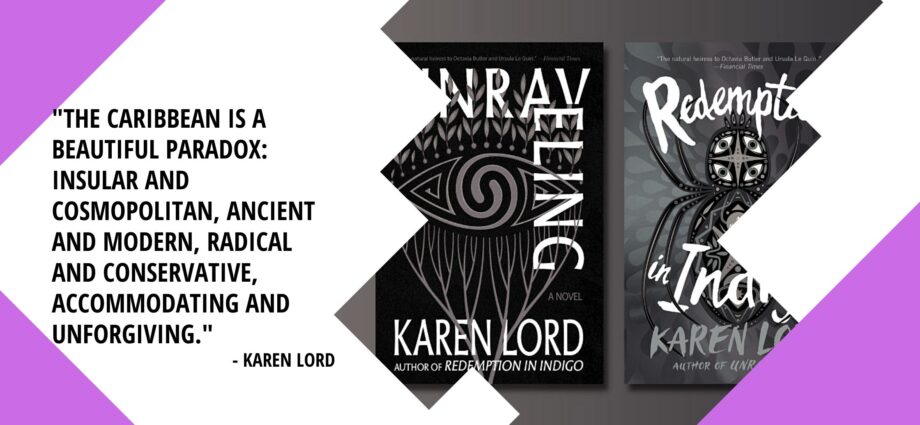There is a strange and exquisite tension in Caribbean literature, a push and pull between what was imposed and what remains uncolonized. Between survival and reimagination. In this space, speculative fiction resurrects, rewrites, and reclaims.
I first encountered Karen Lord while tracing the lineages of Caribbean futurism, looking for artists and writers who weren’t just inserting the Caribbean into the future, but reconstructing the idea of time itself. Her name surfaced, with a certain gravity. Her stories didn’t just exist, they endured.

Lord’s debut novel Redemption in Indigo is not a fairy tale. This is a fable where the real magic is a woman walking away from a man who brings her down. The story draws on a Senegalese folktale, but under Lord’s pen, it becomes a sharp inversion of the Western fairy tale: not a search for love, like most fairytale endings, but a reclamation of agency. At its core is Paama, who inherits the Chaos Stick, a powerful instrument once held by a deity named Chance. Chance, jaded by humanity’s repeated failures, is stripped of his power. But Paama’s strength lies in her resistance to chaos. Even when the trickster gods send insects and mischief to derail her, she remains centered. She is not swept up in magic; she wields it with integrity.
Speculative Fiction IN THE CARIBBEAN
“The Caribbean is a beautiful paradox: insular and cosmopolitan, ancient and modern, radical and conservative, accommodating and unforgiving.” – Karen Lord
That’s Lord, describing Caribbean speculative fiction and, in many ways, herself. Her work resists simplification. It’s speculative fiction rooted in anthropology, in memory and in soil. Her second novel, The Best of All Possible Worlds, follows the remnants of the Sadiri people, intellectually advanced and emotionally reserved, after their planet is decimated. Inspired by the real-world gender imbalance of victims during the 2004 tsunami, Lord builds a world where men must search the galaxy for cultural kinship, hoping to restore their lineage. It’s a quiet epic, braided with questions: What does it mean to rebuild a people? How much of a culture can you lose before it stops being itself?
And perhaps more importantly: Can science fiction be used as a method of cultural preservation?
In Lord’s universe, yes.
She travels the Caribbean culture into space, by deconstructing and then reconstructing it, weaving folklore with futurism, sociology with storytelling. Her PhD in religious studies and background in socio-economic research saturate her narratives. Whilst examining how identity, memory, and migration shift under pressure. Her third novel, The Galaxy Game, continues the Sadiri narrative, taking the conversation further into psychic abilities, political systems, and cultural diaspora.

Her editorial work in New Worlds, Old Ways: Speculative Tales from the Caribbean gives a platform to other Caribbean voices, expanding the range of what Caribbean futures might look like and documenting possible realities.
It’s no surprise, then, that Lord sees libraries as cultural engines. Storytelling is not only an art or entertainment, but an inheritance.
Born in Barbados in 1968, Karen Lord has lived many lives: teacher, diplomat, research consultant with numerous awards like the Frank Collymore Literary Award, Mythopoeic Fantasy Award, and Parallax Award.
In Redemption in Indigo, gods bicker and meddle, but it’s a woman’s steady hand that carries the weight of destiny. In The Best of All Possible Worlds, love becomes a language of rebuilding. And throughout all her work, Lord demonstrates that the future does not belong only to those with power or technology, but to those who remember, who adapt, and who imagine.

